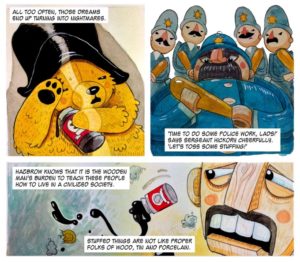what is your name?
Janos Honkonen
how would you describe what you do?
I’m a writer. My dayjob is a video game writer, but I also write traditional fiction. I have published a novel called Kaiken yllä etana, a number of short stories in Finnish and in English, and comics. You can find my bibliography here: http://blog.vornaskotti.com/bibliography/
I also play theremin in a band called Älymystö (http://www.alymysto.com/) , in a project called Viihteen uusi aalto / The Advanced Entertainment Movement (https://viihteenuusiaalto.bandcamp.com) and the now defunct Radiokatve.
what are you currently working on?
Right now my day job is a lead writer in an undisclosed game project in a Finnish game studio. I’m currently working on an English language film script aimed for international audiences. Additionally I’m trying to get another novel off the ground, but so far I have three beginnings which have stalled for one reason or another.
what has had the greatest influence on your work?
In games it’s definitely both old school and modern interactive fiction, also known as text adventures. I was a huge fan of those in the 80’s and early 90’s. Although I was a kid, I felt something was missing in them, something past a series of gimmicky puzzles. I picked them up in the early 2000’s when I found Adam Cadre’s Photopia, which blew my mind. Text adventures are the first types of games which can be called mature and literary writing wise, in my opinion.
In fiction, I guess the biggest influences are Philip K. Dick and I’m surprised to notice, Neal Stephenson. Speaking both as a reader and a writer, I’ve always been fascinated with stories where the reality twists and turns, which certainly is the hallmark of PKD. With Stephenson, what I love in his work is the “education by accident” thing he does. “Right now I’ve fascinated by this thing, and soon you are too, my dear reader!”I mean, with the Baroque Cycle books he made the 17th century trade politics sound so interesting I had to read more about that.
Of course there are more influences, like the old school masters of sci-fi like Arthur C. Clarke, Isaac Asimov, especially Stanislav Lem, and from the horror side of things Clive Barker. They provide the foundation for why I write speculative fiction. Kim Stanley Robinson’s Mars trilogy affected me in a personal level, I guess it’s the only piece of fiction that has nudged me politically, but it didn’t really affect my writing.
what is the greatest misconception about you or your work?
That ideas or inspiration matter. I mean sure, good ideas are needed, of course, but in many of the books I like the actual idea is extremely straightforward, and it’s the characters that make the story. Also, everybody has ideas, the value is in the execution.
Writing is work. You sit down, hammer out some words, hope they are good words and return later to hammer them some more. If you wait for a magical lightning of inspiration before starting to write, odds are you don’t get a whole lot done.
Of course there are exceptions, and those exceptions are wonderful. I was writing a story for this anthology, and realised that it was very derivative of an old Finnish short story I had read as a kid, and frankly rubbish. I almost abandoned the anthology, until I stepped out of my then day job and suddenly the non-fiction history book I was reading meshed with the theme of the anthology perfectly. I walked to the restaurant in a fugue, when I got back to the office the story was ready, and I wrote it down in two sessions. It was nominated for the local Atorox prize. I translated the story in English. It’s called The Air Itself Caught Fire and you can read it in the upcoming Never Stop anthology published for Worldcon 75.
With game writing, I guess people don’t realize how collaborative it is. Writing a novel is an one person show in the sense that the writer produces the text, throws it to the editor, they have a back and forth and that’s it. In films the screenwriter makes the script, gets paid and the director does whatever they want with it. These are of course simplifications, but essentially the writer fires and forgets. In games, ideally, the writer is present from the conception to the idea to the last polish before the gold master, collaborating with every cog of the game creation engine. They are generally a part of the team, not an auteur who forces their vision on the whole team.
The greatest misconception about me? I guess, especially lately, that would be me being an extrovert and an exceptionally positive person. I’ve described myself as a loner and an introvert with industrial scale social coping mechanisms. As for positivity, I don’t know. I used to enjoy the little things and moments in life, and I did and continue to do a lot of stuff, and I guess if you look from afar and squint just right, it looks like positivity.
what do you see as the main strengths and weaknesses of the medium you work in?
Video games are pretty much the only medium I can think of where you can be literally inside the story, to control it, to alter it, and to be the main protagonist. No other media can do that. The biggest weakness of video games is that even in story driven games, the story is very much limited by the budget and the timetable. In a novel it’s easy to write a massive baroque castle and thousands of troops, but if you write that for a game, the producer might start squirming. If things get delayed, whole swaths of the story have to be cut out, which leaves the writer to scramble to get what’s left make some sense. Also, the story has to fit the gameplay, and the gameplay fit the story. This is a challenge, where often the story has to yield.
how has technology impacted upon the work you do?
When writing fiction, I love tools like Scrivener. The negative side is that having some trouble concentrating on things, my mind and mouse gets really easily drawn to the quick bursts of dopamine provided by social media. I can’t turn the net off either, since I need it for background research. I’d like to have some low level AI that monitors my net use, giving access only to background research stuff, and blocking Facebook.
With games, I almost wish for the technology to dial back a little, to give more room to text based storytelling. Then again, this is probably just dumb nostalgy.
what’s the greatest piece of advice you would like to pass on?
Don’t wait for inspiration, just write.
where can we find you online?
My blog and web page resides in http://vornaskotti.com. My twitter is https://twitter.com/vornaskotti, but there you can find mostly cranky commentary on politics and social issues in Finnish. My Facebook is https://www.facebook.com/janos.honkonen.page/
what are you reading at the moment?
I just finished Margaret Atwood’s The Handmaid’s Tale, which was impressive and disconcerting. I wanted to read it before starting on the series.
what are you listening to at the moment?
I don’t listen to much music anymore, as in specific artists. Spotify’s Daily Mixes and personalized radios are scary good in providing good stuff. I never knew there were so many noise, avant-garde, world music and weird jazz bands in the world. Philip Glass is my go to writing music. Venetian Snares in cranky manic days.
I listen mostly to audiobooks. Right now I’m listening to Trekonomics by Manu Saadia.



